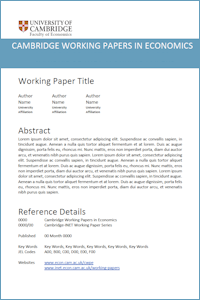
Liu , K.
Public Finances, Business Cycles and Structural Fiscal Balances
CWPE1411
Abstract: This paper proposes a new framework to analyze and estimate structural fiscal balances. Stochastic trends are properly incorporated, and the numerical solution of the DSGE model serves as part of the Kalman smoother to extract structural fiscal balances. For the UK, a setting of an integrated random walk for the underlying stochastic trends fits the date best. The response of nominal fiscal revenue to the technology shock is small. The shocks to foreign demand and to foreign goods price both have positive effects on fiscal revenue. An expansionary monetary policy shock has a great positive short-run impact on fiscal revenue, but the influence is not persistent because of the open-economy characteristic of the UK. An expansion in government spending can also increase fiscal revenue, but the effect is not persistent as well due to the domestic and external crowd-out effects. A contractionary fiscal policy (cutting government expenditure or increasing the lump-sum tax temporarily), rather than an expasionary one, will benefit economic recovery and also improve fiscal stance. Compared to a temporary increase of the lump-sum tax, cutting government spending is relatively more effective and it alleviates the two kinds of crowd-out effects.
Keywords: business cycles, structural fiscal balances, DSGE model, Kalman filter and smoother
JEL Codes: C54 E32 E62 H62
Author links:
PDF: https://www.econ.cam.ac.uk/research-files/repec/cam/pdf/cwpe1411.pdf 
Open Access Link: https://doi.org/10.17863/CAM.4950
